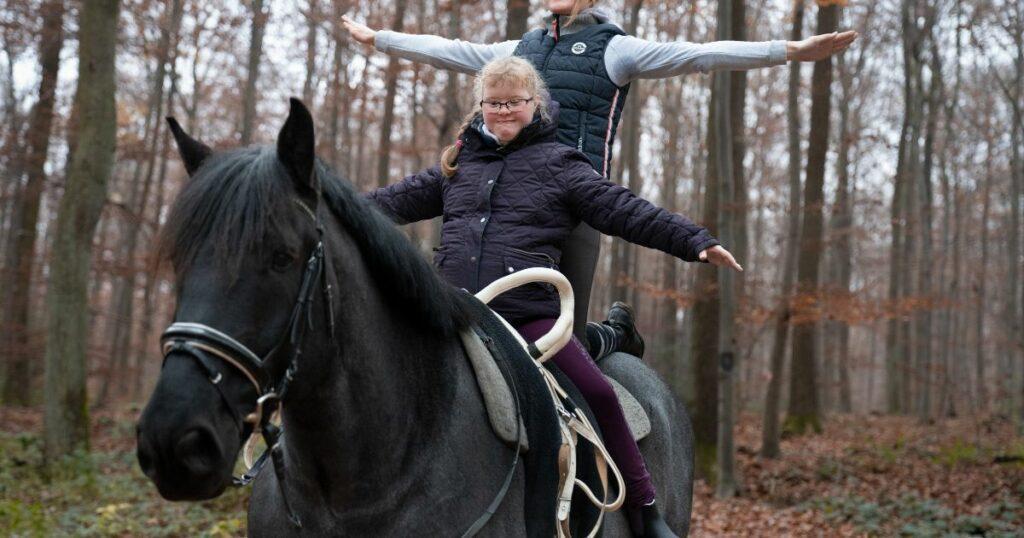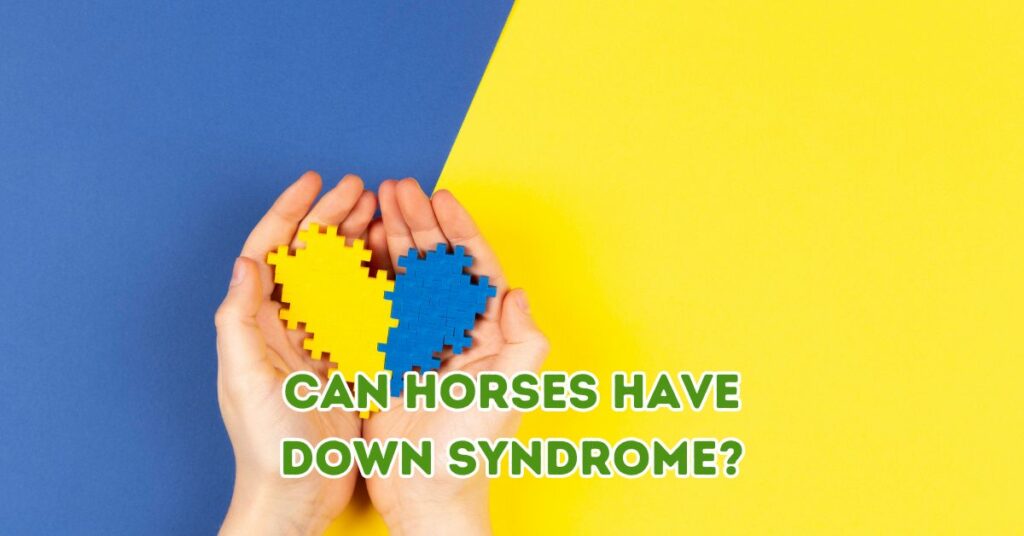As an Amazon Associate we earn from qualifying purchases.
Down Syndrome is one of the most common genetic conditions in humans, and is caused by an extra copy of chromosome 21. But did you know that horses can have Down Syndrome too? Known as Equine Down Syndrome, this rare condition can cause physical, mental, and behavioral issues in horses. In this article, we will explore the symptoms of Down Syndrome in horses and provide information on diagnosis and treatment options.
Can Horses Have Down Syndrome?
The answer is yes, horses can have Down Syndrome. Down Syndrome in horses is also known as Equine Down Syndrome, and is caused by an extra copy of chromosome 32.
Down Syndrome in horses is very rare, with only a few hundred cases reported worldwide. While the exact prevalence of the condition is unknown, it is estimated that the odds of a horse being born with Down Syndrome is 1 in 10,000.
Symptoms Of Down Syndrome in Horses
Horses with Down Syndrome are often born with physical defects, such as a short or abnormally shaped head, short limbs, and a curved or twisted spine. They may also have heart defects, as well as eye and ear abnormalities.
Additionally, horses with Down Syndrome may have digestive issues, such as difficulty digesting food or difficulty absorbing nutrients from food.
Mentally, horses with Down Syndrome may have difficulty learning, difficulty following directions, and difficulty communicating. They may also display behavioral issues, such as restlessness, aggression, or other unpredictable behaviors.
How To Care For Down Syndrome Horses?
If a horse has been diagnosed with Down Syndrome, it is important to provide them with the best possible care and treatment.
Horses with Down Syndrome can experience problems with muscle tone and coordination, and may be more prone to respiratory issues. Make sure to keep up with regular vet visits to monitor your horse’s health.
Second, provide an environment that is safe and stimulating. Horses with Down Syndrome may need more time and patience while being trained, so it is important to be patient and supportive. Additionally, providing your horse with toys and other enrichment activities can help keep them mentally stimulated.
Third, make sure to provide your horse with regular exercise. Horses with Down Syndrome may have difficulty with coordination, but regular exercise can help to strengthen muscles and improve coordination. Additionally, exercise can help to reduce stress and provide mental stimulation.
Finally, make sure to provide extra care and patience. Horses with Down Syndrome may need more time to learn and process information, and may require a different approach to training. It is important to be patient and understanding, and to provide extra care and attention.
Caring for a horse with Down Syndrome can be a rewarding and fulfilling experience. With patience, understanding, and extra care, you can provide your horse with the best care possible.
Everything You Need to Know About the Coggins Test in Horses
Is Down Syndrome In Horses The Same As In Humans?
It is important to note that Down Syndrome in horses is not the same as it is in humans. While humans with Down Syndrome have an extra copy of chromosome 21, horses with Down Syndrome have an extra copy of chromosome 32.
Down syndrome is a condition caused by an extra copy of a chromosome that results in a range of physical and cognitive differences. While there are similarities between Down syndrome in humans and horses, there are important differences that must be taken into consideration.
In humans, Down syndrome can cause developmental delays, intellectual disability, and physical problems such as poor muscle tone. For more information on Down Syndrome in humans follow this link.
In horses, Down syndrome manifests itself in physical defects such as a short neck and abnormal head shape. Furthermore, horses with Down syndrome are typically born with a heart defect, which can lead to respiratory issues and other complications.
While humans with Down syndrome can live normal lives, horses with Down syndrome tend to have shortened lifespans due to the increased risk of complications. Ultimately, while both humans and horses can have Down syndrome, there are significant differences in how it is manifested and the severity of its effects.
What Is Down Syndrome?

Down Syndrome is a genetic condition in which a person has an extra copy of chromosome 21. This extra chromosome causes physical, mental, and behavioral issues. In humans, the symptoms of Down Syndrome can include physical defects, such as a short or abnormally shaped head, short limbs, and a curved or twisted spine.
They may also have heart defects, as well as eye and ear abnormalities. Mentally, people with Down Syndrome may have difficulty learning, difficulty following directions, and difficulty communicating. As well as this they may also display behavioral issues, such as restlessness, aggression, or other unpredictable behaviors.
In horses as Down Syndrome is caused by an extra copy of chromosome 32 the symptoms are slightly different from those in humans.
What Is A Chromosome?
A chromosome is a structure within a cell that contains genetic material. Chromosomes are made up of DNA and proteins, and they carry genetic information that is passed down from one generation to the next. Humans typically have 46 chromosomes, while horses typically have 64 chromosomes.
What Is Chromosome 21?
Chromosome 21 is one of the 46 chromosomes found in humans. It is the smallest human chromosome and is responsible for carrying genetic information that is passed down from one generation to the next. Humans with Down Syndrome have an extra copy of chromosome 21, which causes physical, mental, and behavioral issues. Chromosome 21 does not exist in horses.
What Is Chromosome 32?
Chromosome 32 is one of the 64 chromosomes found in horses. It is responsible for carrying genetic information that is passed down from one generation to the next. Horses with Down Syndrome have an extra copy of chromosome 32, which causes physical, mental, and behavioral issues. Chromosome 32 does not exist in humans.
Can Horses Have Down Syndrome? – Final Thoughts
The answer to the question can horses have down syndrome is that down syndrome in horses is a rare but possible condition. It is important to understand the similarities and differences between Down syndrome in humans and horses, so that we can provide the best care possible for horses affected by the condition.
Amazon and the Amazon logo are trademarks of Amazon.com, Inc, or its affiliates.

Hey there, I’m Jasmine! I’m a total horse fanatic and have been working with these amazing animals for as long as I can remember. I’m passionate about sharing my love for horses with others and helping them learn more about these majestic creatures. As a professional horse trainer and riding instructor, I’ve developed a deep understanding of equine science and am committed to the welfare of horses. That’s why I founded OwnTheHorse.com, a blog where I share my knowledge and insights with fellow horse enthusiasts. I love connecting with my readers and building a friendly community of horse lovers. Whether you’re a seasoned equestrian or just starting out, I’m here to help and inspire you. Above all, I’m a friendly and compassionate person who truly cares about the well-being of horses and their human companions.

